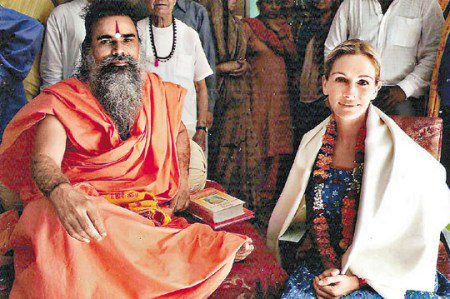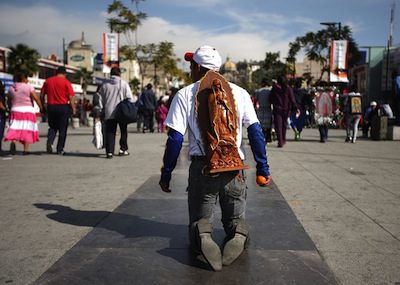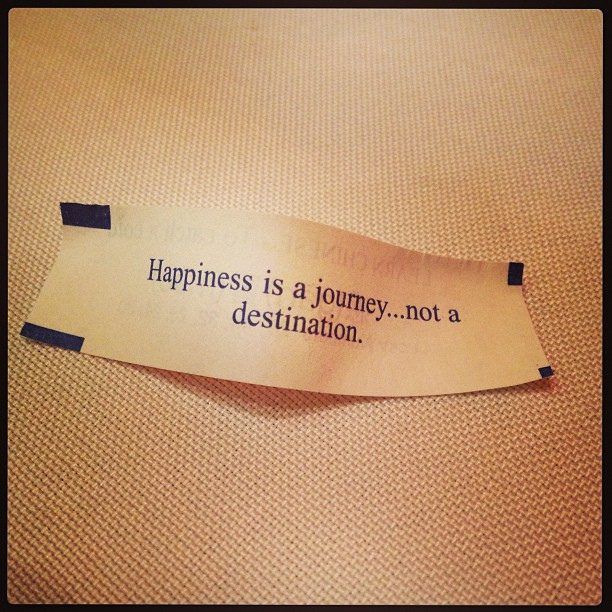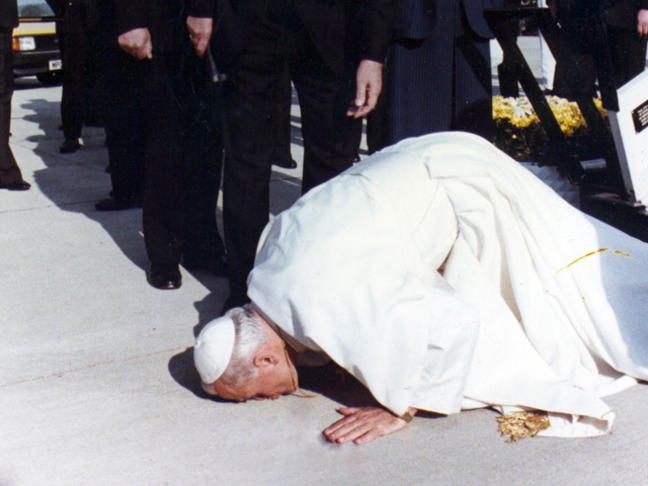 It is a trend for white people fed up with the banality of existence to run to exotic locations and there write best-selling books about finding themselves. And while I admit to a certain romance in spending thousands learning to eat, pray, love, and afterwards become rich selling the simplicity of foreign cultures back to our own, I can’t help but wonder whether the “self” is really “found” in such amazing, caucasian explorations. I wonder — because I’m cynical — if the self hasn’t been distracted, happily confusing a change of location with a change of heart and an experience of other people’s vibrant — usually religious — lives with a newfound vibrancy of its own. New life without new decisions, “awakening” through cultural osmosis, all this self-finding — in my experience, ends in what Cormac McCarthy speaks of in his novel No Country For Old Men:
It is a trend for white people fed up with the banality of existence to run to exotic locations and there write best-selling books about finding themselves. And while I admit to a certain romance in spending thousands learning to eat, pray, love, and afterwards become rich selling the simplicity of foreign cultures back to our own, I can’t help but wonder whether the “self” is really “found” in such amazing, caucasian explorations. I wonder — because I’m cynical — if the self hasn’t been distracted, happily confusing a change of location with a change of heart and an experience of other people’s vibrant — usually religious — lives with a newfound vibrancy of its own. New life without new decisions, “awakening” through cultural osmosis, all this self-finding — in my experience, ends in what Cormac McCarthy speaks of in his novel No Country For Old Men:
You think when you wake up in the mornin yesterday dont count. But yesterday is all that does count. What else is there. your life is made out of the day’s it’s made out of. What else is there? Nothin else. You might think you can run away and change your name and I dont know what all. Start over. And then one mornin you wake up and look at the ceiling and guess who’s layin there?
But let’s get to the point. The difference between a tourist and a pilgrim is this, that the pilgrim seeks, while the tourist seeks a mirror. For the tourist, the location hardly matters. He could tour New York City or Calcutta, Paris or the Sahara. His name reveals his motive. He tours, from tourn, a turn and a circling of something — not a penetration. He is primarily concerned with his experience of the place — not the place itself. Thus he is pleased with that phrase that emblazons the corners of travel blogs and high-school hallways:
Since he is ultimately concerned with his own experience, the tourist is concerned with questions that may –on the surface — seem odd: “Is this authentic?” “I am really seeing the Coliseum?” “Did I really get everything I could out of this trip?” “Did I really take advantage of this marvelous Parisian opportunity?” He must constantly question the validity of his own travels, because his goal is an experience, not a destination, and while a destination is a fact as solid as St. Peter’s Cathedral, experience is fickle beast, always sinking the fang of disappointment right when it should exalt, as when the man sniffs at The Last Supper and admits — but only to himself — that it looked better in the Da Vinci Code, or finds Niagara “a little overrated.” And who hasn’t been in this position?
 Now the pilgrim takes joy in the journey with the understanding that the journey only exists because of the destination. The destination lights the journey with joy. The pilgrim — somewhat idiotically, I suppose — is interested in some thing at the end of his pilgrimage. The woman crawling on her knees to reach the tilma of Our Lady of Guadeloupe is not interested in whether she’s engaging in “an authentic experience” — she is interested in Our Lady. The pilgrim in Rome is not there to find himself, he is there — and again, it sounds too easy — to find Rome, because Rome matters. The tourist, on the other hand, runs to Rome to see “the sights.” What the sights are isn’t exactly what’s at issue here — it’s enough that they are sights, for sights allow experience, and what’s needed is a good experience.
Now the pilgrim takes joy in the journey with the understanding that the journey only exists because of the destination. The destination lights the journey with joy. The pilgrim — somewhat idiotically, I suppose — is interested in some thing at the end of his pilgrimage. The woman crawling on her knees to reach the tilma of Our Lady of Guadeloupe is not interested in whether she’s engaging in “an authentic experience” — she is interested in Our Lady. The pilgrim in Rome is not there to find himself, he is there — and again, it sounds too easy — to find Rome, because Rome matters. The tourist, on the other hand, runs to Rome to see “the sights.” What the sights are isn’t exactly what’s at issue here — it’s enough that they are sights, for sights allow experience, and what’s needed is a good experience.
The pilgrim does not walk into a cathedral because it is “a sight,” but because he believes God allows himself to be present between the pillars. The tourist walks into the same cathedral because he believes culture is there, but what he does not recognize — drifting past the statues, tombs, and ribbon-rising incense — is that the culture is there because of the God, and cannot be “experienced” in its fullness without this raison d’etre, this thing, this fact that has basilicas, chapels and shrines roaring out of otherwise dignified villages in a constant fire-alarm of clanging bells, streaming people, drifting smoke, sprinkled water, and pitiful pleas for salvation. The second-hand experience is not the experience. To see something because it is a “sight” is not to see it for precisely what it is.
Believe it or not, this is not some blithe lambasting of our culture, which appreciates no holy ground (only interesting ground (well that was a lambasting)). It is, rather, an explication of two possible modes of existence. I suppose it could be phrased in a multitude of ways, but have my surest shot.
As long as we are alive, we have the choice to either observe or to relate. We may observe the man at the gas station, or we may love him. We may tour the vast realms of philosophy, become knowledgable about every argument, every movement, and every figure of historical importance — or we may believe something. We may experience, recognize and appreciate the good in all religions, see the value of different cultures as if we were orbiting the globe, nod our heads appreciatively at the diverse flux of life — and all the while refuse to live — pale, uncultured people drifting from place to place in hope that earnestness and meaning will rub off on us. We have the terrifying opportunity to relate to people, places and things in real, thick relation, to love the heart of the land we were born in, to love the person and the innermost center of our beloved, to contemplate the beauty of Nature, the meaning and the reality of the stained-glass window, and the reason for the church and it’s steeple — or we can be content with experiencing these things, circling tourists in an interesting Cosmos.
When we relate to something we are changed. I cannot love a woman without becoming something greater. I cannot be in holy communion with my brothers and sisters in faith with being made that much more holy. I cannot love a novel, nor contemplate a piece of art without taking that art within myself and being ennobled by it. Relation changes me, not into some one else, but into the self I truly am, the self I long to be. But when we merely experience something, we stay the same. This is why relation lends itself to repetition, while mere experience lends itself to a need for novelty. When I love a place, I go there again and again, finding ever more depth in what it offers, for I have been changed by my relation into a lover. When I tour a place, I usually tour it once before checking it off my list. On my next vacation I’ll seek something new, for I have not changed, I have simply eaten, digested, and excreted a place and a culture.
“Finding ourselves” by changing our location, experiencing new ideas and tasting foreign cultures is simply a bad replica of religious conversion. Becoming ourselves by real relation to something valued for its own existence — the pilgrim’s way — is worth dying for.













